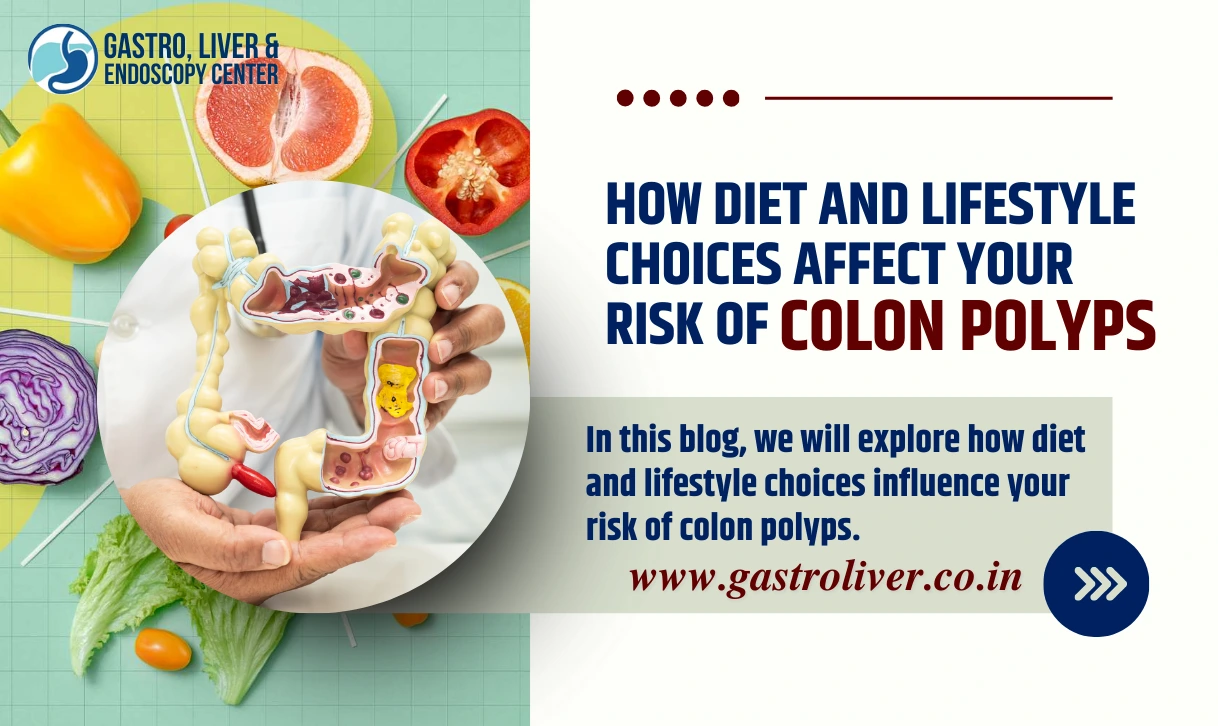How Diet and Lifestyle Choices Affect Your Risk of Colon Polyps
Colon polyps are small growths that develop on the inner lining of the colon or rectum. While most polyps are harmless, some can develop into colorectal cancer if left untreated. This makes understanding risk factors and prevention essential for maintaining digestive health. At Gastro, Liver & Endoscopy Center, under the expert guidance of Dr. Manish Kumar Gupta, patients receive comprehensive care to prevent, diagnose, and treat colon-related issues.
In this blog, we will explore how diet and lifestyle choices influence your risk of colon polyps, and why consulting the Best Gastroenterologist in Ghaziabad and Noida is crucial for early detection and management.
What are Colon Polyps?:
Colon polyps are abnormal tissue growths that can vary in size and shape. They are often detected during colonoscopy—a safe and effective procedure offered at the Best Colonoscopy Centre in Noida and Ghaziabad.
There are several types of polyps, but adenomatous polyps (adenomas) are most concerning, as they can turn into cancer over time. Detecting them early reduces cancer risk significantly.
Diet and Its Impact on Colon Polyps:
Your daily diet plays a direct role in colon health. Certain foods can increase the risk of polyps, while others may help protect your colon.
Foods That Increase the Risk:
- Red and Processed Meats: Frequent consumption of red meat (beef, pork, lamb) and processed meats (sausages, bacon, hot dogs) has been linked to a higher risk of colon polyps.
- High-Fat Diets: Diets rich in saturated fats can promote polyp formation by causing inflammation in the digestive tract.
- Low Fiber Intake: Fiber helps in regular bowel movements and reduces toxin exposure in the colon. A lack of fiber increases polyp risk.
- Excess Alcohol: Drinking too much alcohol can damage the colon lining, leading to polyp development.
Foods That Protect Against Polyps:
- High-Fiber Foods: Whole grains, beans, lentils, and vegetables support colon health.
- Fruits Rich in Antioxidants: Berries, apples, and citrus fruits reduce inflammation and protect against abnormal cell growth.
- Calcium and Vitamin D: Dairy products, leafy greens, and sunlight exposure can reduce the likelihood of polyps.
- Omega-3 Fatty Acids: Found in fish, walnuts, and flaxseeds, they help lower inflammation.
Lifestyle Choices and Colon Polyp Risk:
Beyond diet, several lifestyle factors can either reduce or increase the chances of developing polyps.
- Physical Inactivity: A sedentary lifestyle slows down bowel function, raising the risk of polyps and colorectal cancer.
- Obesity: Excess body weight is directly linked to a higher prevalence of polyps.
- Smoking: Tobacco use increases the risk of both polyps and colorectal cancer.
- Stress and Poor Sleep: Chronic stress and lack of quality sleep can weaken immunity and digestive health.
Adopting an active lifestyle, maintaining a healthy weight, and quitting smoking can dramatically reduce polyp risk.
Why Early Detection Matters:
Beyond diet, several lifestyle factors can either reduce or increase the chances of developing polyps.
- Rectal bleeding
- Unexplained changes in bowel habits
- Abdominal pain or discomfort
- Iron deficiency anemia
Regular screening is the most reliable way to detect and remove polyps before they become cancerous. At Gastro, Liver & Endoscopy Center, patients benefit from advanced endoscopy and colonoscopy services led by Dr. Manish Kumar Gupta, one of the Top Gastroenterologists in Noida and Ghaziabad.
Colonoscopy: The Gold Standard in Prevention:
A colonoscopy is the most effective test for finding and removing polyps. At the Best Colonoscopy Centre in Ghaziabad and Noida, advanced equipment ensures a painless and accurate procedure. Early intervention not only prevents cancer but also provides peace of mind for patients.
How Dr. Manish Kumar Gupta Can Help:
With years of expertise in gastroenterology, Dr. Manish Kumar Gupta is recognized as the Best Gastro Doctor in Noida and among the Best Gastroenterologists in Ghaziabad. At Gastro, Liver & Endoscopy Center, he offers:
- Comprehensive digestive health evaluations
- Personalized diet and lifestyle modification plans
- Advanced colonoscopy and endoscopy procedures
- Ongoing preventive care and patient education
Practical Tips for Reducing Colon Polyp Risk:
- Eat more plant-based foods and whole grains.
- Limit red and processed meat intake.
- Exercise for at least 30 minutes a day.
- Avoid smoking and excessive alcohol consumption.
- Stay hydrated and maintain a healthy weight.
- Schedule regular colonoscopy screenings if you are above 45 or have a family history of colon cancer.
FAQs:
1. What are colon polyps and are they dangerous?
Colon polyps are growths on the colon lining. While most are harmless, some can develop into cancer if left untreated.
2. Can diet alone prevent colon polyps?
Diet plays a major role, but lifestyle habits like exercise, avoiding smoking, and regular screenings are equally important.
3. At what age should I start screening for colon polyps?
Generally, screening begins at age 45, but if you have a family history of colorectal cancer, you may need earlier check-ups.
4. How often should colonoscopy be done?
For average-risk patients, every 10 years is recommended. High-risk individuals may require screenings every 3–5 years.
5. Do colon polyps cause symptoms?
Most polyps are symptomless. However, some may cause rectal bleeding, changes in bowel habits, or abdominal discomfort.
6. Can obesity increase the risk of colon polyps?
Yes, obesity is strongly linked with a higher chance of developing polyps and colorectal cancer.
7. Why should I choose Gastro, Liver & Endoscopy Center for colonoscopy?
Because it is one of the Best Colonoscopy Centres in Noida and Ghaziabad, led by Dr. Manish Kumar Gupta, the Top Gastroenterologist in Noida and Ghaziabad, ensuring expert care with modern technology.
8. Are colonoscopies painful?
No, colonoscopies are performed under sedation, making the procedure comfortable and safe.

